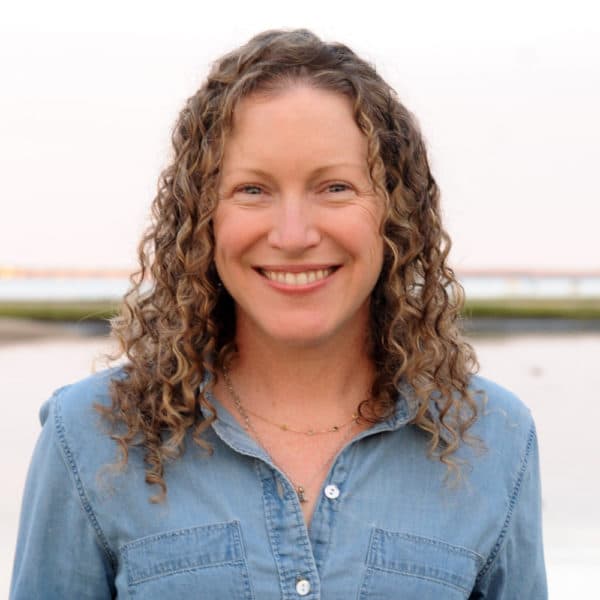Advertisement
Commentary
Running with hope: The Boston Marathon, 10 years after the bombings
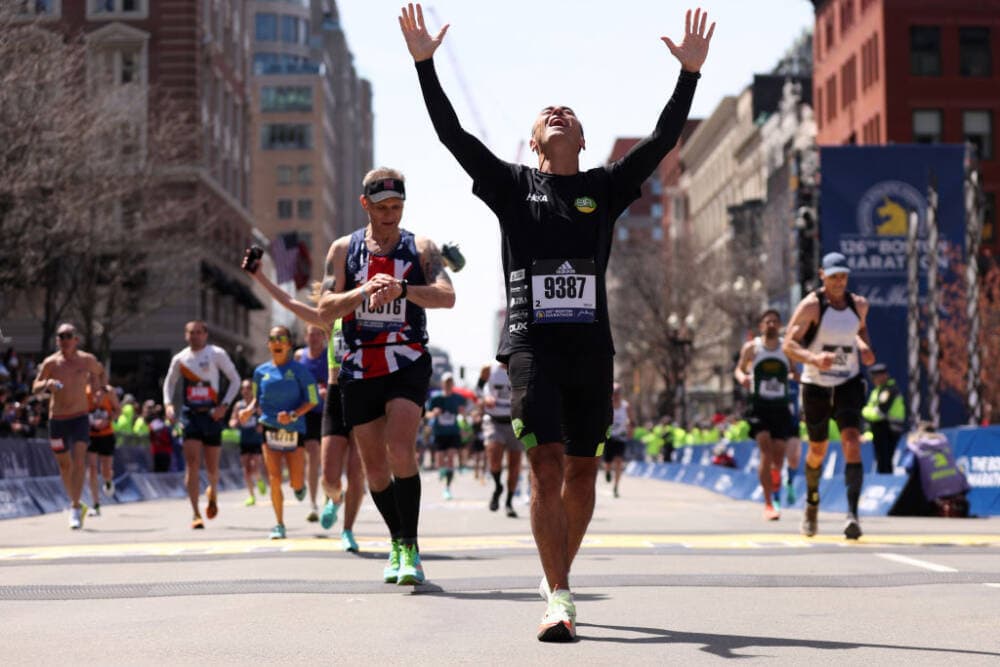
Editors' note: How do we reclaim something we love, when it’s forever marked by tragedy? How do we move forward in a world that is fundamentally different than the one we thought we knew?
These were the questions we asked our readers and contributors as we considered how to mark the 10 years since the Boston Marathon bombing. The blast killed three people, injured hundreds more and forever changed the story of the World’s Greatest Marathon.
The events of April 15, 2013, disrupted our foundational sense of safety. And from your responses, we learned that the details of that day remain vivid a decade later. Tom Meagher, who’s greeted the winners of the Marathon every year for the past 27, remembers the color of smoke from the first blast, the smell in the air. Tracey Palmer grew up going to the race. She and her two young daughters were standing in front of the Mandarin Hotel when the force of the second blast sent glass and steel flying just 50 feet away. Timothy Peck, who worked in the emergency department at Beth Israel, remembers realizing that the circles he was seeing in patients’ X-rays were actually ball bearings.
Whether you were at the finish line, somewhere along the course, or hundreds of miles away, so many of you had similar experiences. The moment you realized “what if?” The sinking realization that, yes, it could happen here.
Still, Tracey’s husband Tim returned and ran again, in 2014, his 18th consecutive time running Boston. Tim Peck ran the with a colleague in 2017 and 2019. And Tom Meagher will be at the finish line again this year, his 27th time. The Boston Marathon is an event of human triumph. That part didn’t change.
Some 31,000 people are set to run the marathon on Monday. Thousands more will be cheering them on. We’ll all have to do two things at once: make space for the grief of what was, and welcome the hope and joy still to come.
-- Cloe Axelson and Sara Shukla
(This is an extended version of the piece produced for broadcast. Responses have been edited for length and clarity.)
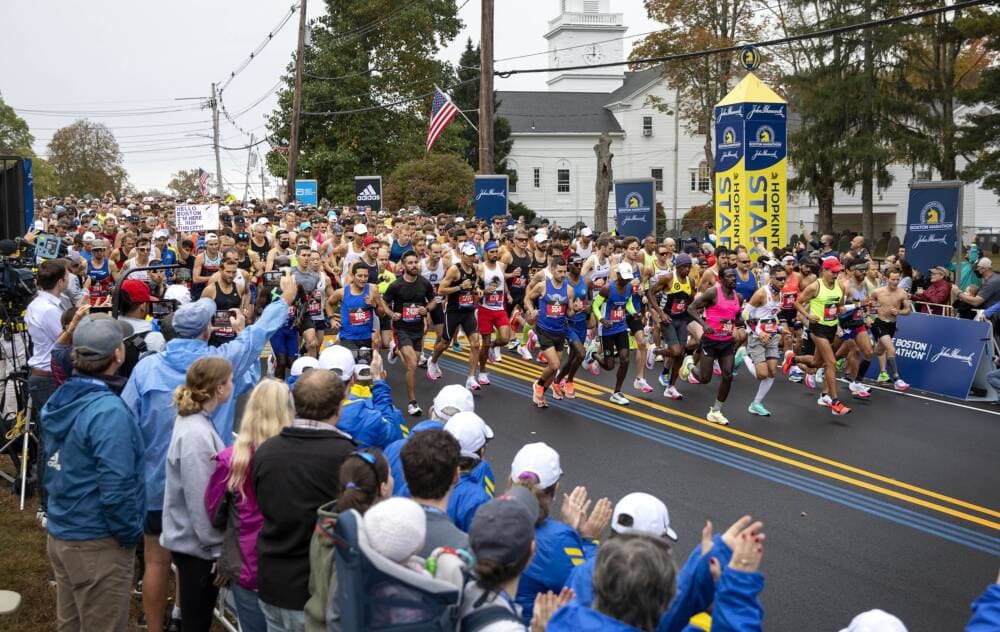
This year will be my 27th year running the finish line of the Boston Marathon. My job is to get the photography squared away: tell them what they can do and what they cannot do. When the winners come in, I go and greet them, and I let them have an opportunity to compose themselves. When I think they're comfortable, three, four, even five minutes later, I take them where they have to go.
When the bomb went off, I ran to help the individual that got knocked down. I never thought of being afraid. I never thought that what I was doing wasn't the right thing to do. Should I have turned and run away? How could I ever do that? At the time, I was in charge of that area. I couldn't run away. It was my turf.
The most important thing for me is, I am not going to be driven off doing something I love doing because I'm afraid that something might happen again in my life. Life has ups and downs. I tell people, especially young people, don't ever say that could never happen to me or that would never happen here. Yes, it can. Yes, it has. And I hope and pray for you that it never happens to you. But you don't know — it’s life.
Advertisement
The Boston Marathon to me is the greatest marathon in the world. How lucky am I to be at the finish line of it every year? I'm a lucky man. And I have the greatest, greatest appreciation for that.
-- Tom Meagher, Boston Marathon finish-line coordinator
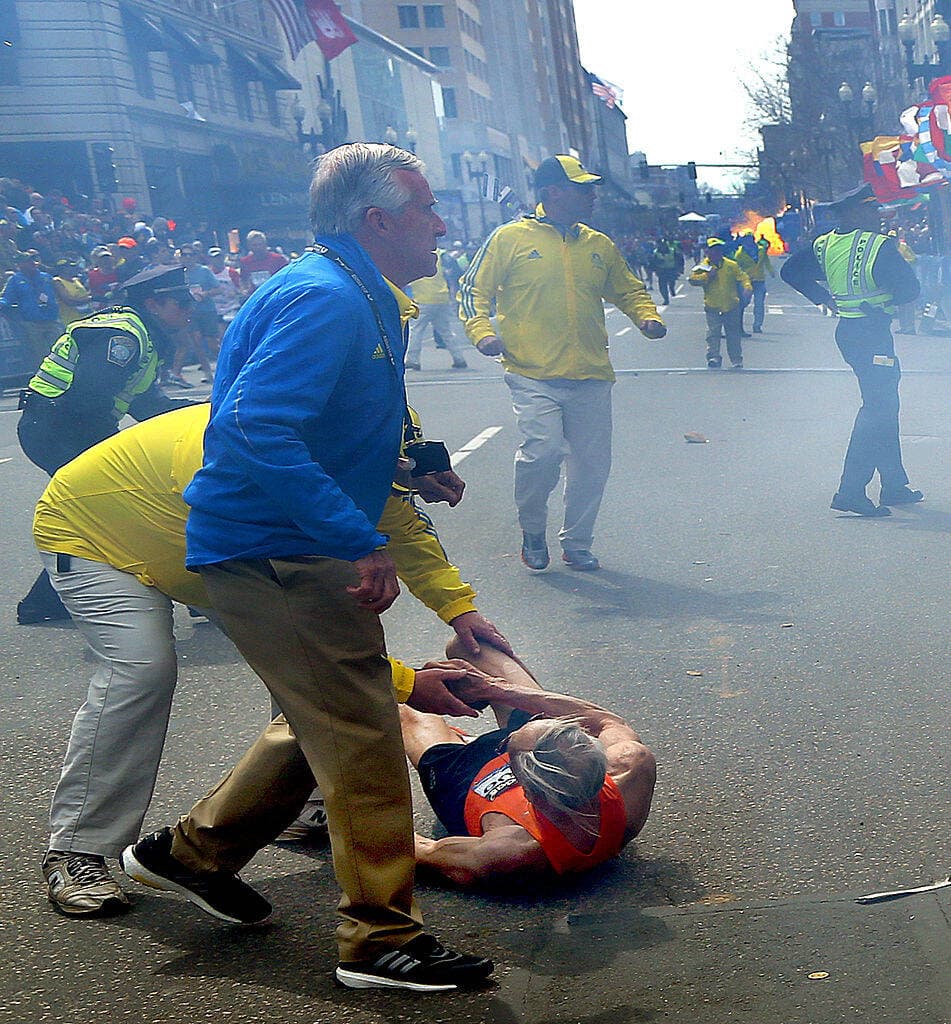
It's probably the only time that I know of, with a mass casualty bombing, where no one who was still alive after the bomb went off died. First, the bomb went off at the center of something like five major trauma centers. There's probably not a place in the known galaxy where you have better access to trauma care than that one spot. Second, because it was the day of the marathon, Boston drivers weren't on the street. The ability of the ambulances to get to the scene and come back meant that time from injury to intervention was really, really short. And then, Irwin Hirsch, who was a legend – a trauma surgeon at Boston Medical Center who died before 2013 – had trained Boston paramedics to apply tourniquets very aggressively. So all these patients with major limb injuries had tourniquets applied within the first minutes. That probably saved countless lives.
Very often the worst of times brings out the best in people. The way that people worked together and established an attitude of, “I’m willing to do anything to help and not think of myself” – it was remarkable. If I could have bottled the spirit that existed in the days around the marathon, I would. It was human beings at their best.
-- Dr. Richard Wolfe, Chief of emergency medicine, Beth Israel Deaconess Medical Center, Associate Professor of Emergency Medicine, Harvard Medical School
If I could have bottled the spirit that existed in the days around the marathon, I would. It was human beings at their best.
Dr. Richard Wolfe, chief of emergency medicine, BIDMC
Do you remember where you were when it happened, and what went through your mind when you heard, or watched on TV, or even witnessed in person? The intervening ten years – COVID, “natural disasters,” tens of thousands of gun deaths – may make it hard for most of us to summon those emotions. But for the mourners, survivors, and first responders, the past is still present.
I’ve been thinking about those folks on this anniversary, as they are asked, "How are you doing?" "What does this day mean to you?" I imagine they have standard answers – verbal reflexes? A kind of armor? “We’re okay.” “She was the light of our lives.” “He loved the marathon so much.”
I wonder if they ever want to wail, “I miss her every day,” or “It’s not as hard as it used to be, except on Sunday nights when we’d always go out for pizza.”
I imagine some of the survivors will be at the finish line. Some will turn off all their screens and machines and spend the day gardening. Some might visit the cemetery, or walk along a beach. Wherever they are, I hope they know that we remember them as well as their loved ones. And that we wish them a measure of peace – on this anniversary and every day.
-- Anita Diamant, author, Brookline, Mass.
Fireworks. That's what I thought the first explosion was.
Tracey Palmer
I've brought my daughters to watch their father/my husband run it almost every year since they were born. He's run and finished 18 times. It was always an exciting and inspiring tradition for them, and a proud moment for my husband.
Fireworks. That's what I thought the first explosion was. Then the second one detonated across the street, about 50 feet from us. As purple-gray smoke billowed toward us, the first words out of my mouth were, "That's a bomb."
There are many moments I'll never forget from that day. The policemen who ran toward the smoke and danger. The complete stranger who gave us a ride. And the tears of relief streaming down my husband's face when he saw us. And my girls' faces… they'd never seen their daddy cry.
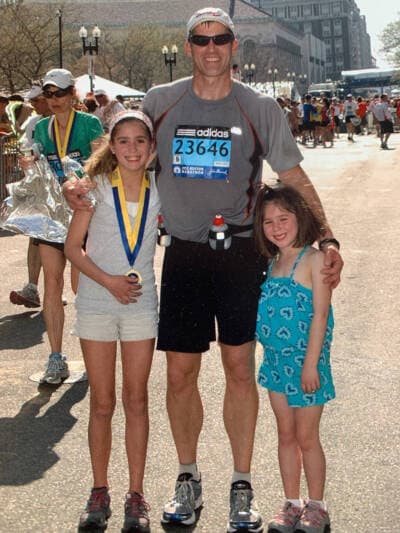
My daughters slept with us for months. For a long time, they wouldn't go to the city, any city. Crowded places made them anxious. For years, loud noises made my younger daughter cry and run to me in a panic. Years later, she was treated for PTSD, and still struggles with lingering anxiety and OCD. But we are okay.
Tim ran the Boston Marathon one last time, the year after the bombing. It was a point of pride for him, of defiance. My older daughter and I cheered him on with friends, up in Wellesley, far from the finish line.
The real legacy of that day, for me, is the vow I made to myself that night after the bombing, the first night the girls slept between us. I promised myself I would be more grateful for them, for all three of them. I wouldn't get angry over stupid things. I would forgive more easily. I would let go of the little things. I would love them harder, and let them know more often how much they meant to me. Nothing is guaranteed in life. That's what the Boston Marathon means to me.
This year, I can't say we will celebrate. But I'm sure one of us will text the family chat group. Someone will post a photo of my husband at the finish line, looking exhausted and triumphant, holding his little daughters hands, one of them wearing his medal, all three grinning like fools, happy.
-- Tracey Palmer, Norwell, Mass.
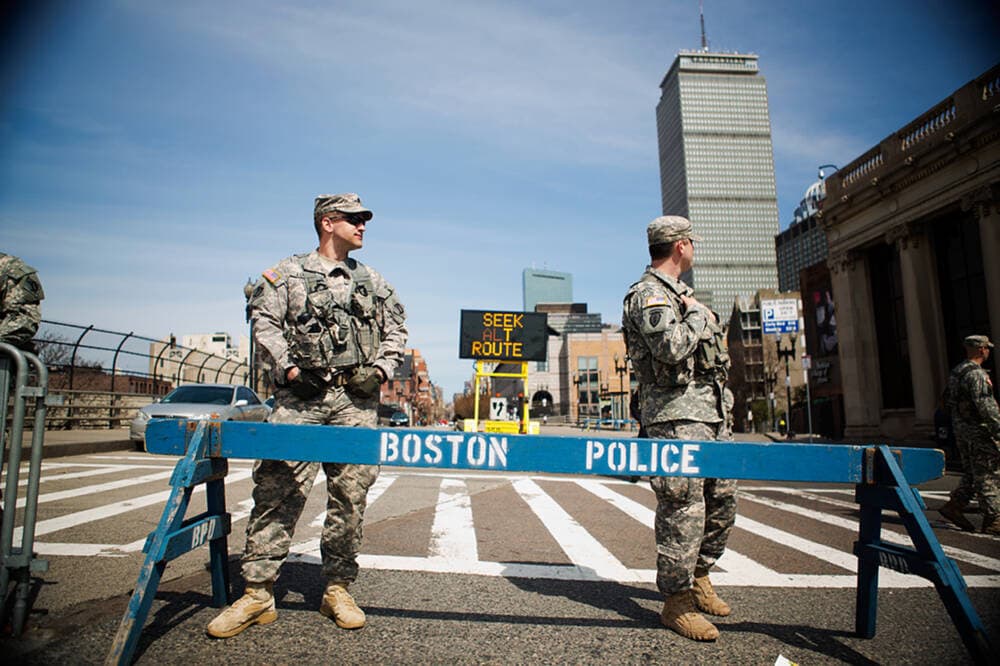
It was my first day as chief resident of emergency medicine at BI. We treated 20-plus patients that day, and I remember every single one. For me, the worst part was actually lockdown, when super sick people came into the ED, and we were extremely understaffed. They were the most stressful days of my life.
I ran the 2015 with my co-resident, who served with me in the ED that day. It brought a good deal of closure for me, for both of us. You don't run a marathon by yourself. You have so many people helping you. I think I learned that when you need to heal emotionally, it takes a community, takes vulnerability to let others help you. And I think those are lessons I've carried forward since.
-- Timothy Peck, emergency medicine doctor, Indiana
I didn’t know what I was getting myself into when I signed up to volunteer at the finish line as a nursing student in 2013, [how] that day would play a major part in my life, my career, and my outlook. I was on St. James helping a tired runner into a wheelchair when we heard the first bomb. Despite the panic, the fear, the confusion and the shock that ensued for everyone over the next few hours and days, the memories that overshadow those feelings now, 10 years later, are those of kindness and resiliency. I’ll be at the finish line caring for runners who need help, physically or emotionally – and cheering on friends who are running — for the 10th year in a row.
-- Julia Anderson, South End, Boston
You don't run a marathon by yourself. You have so many people helping you.
Tim Peck
When we saw smoke and that police were moving the barriers, we knew something was wrong. We ran toward the Charles. At some point, we encountered a woman with shrapnel in her stomach and a bloody sweatshirt tied around her waist. She was in shock – she had no idea what happened, and neither did we. We flagged down a car, quickly informed the driver that something was wrong, and begged him to drive her to MGH.
I remember how unseasonably humid and warm it was on the Friday of the manhunt. I lived in Southie at the time and was disquieted by the stillness of that day. I think about that week every single year. I think about how close I had been, and how reluctantly going to lunch might have saved my life. I wonder who that woman was.
As a spectator, I'm moved to tears witnessing the months – years! – of work and dedication in action for the runners. I love that this event is a combination of elite athletes and "regular people" from across the globe, proving to themselves that they can do the very hard thing they set out to do.
-- Heather Zeman, Wakefield, Mass.
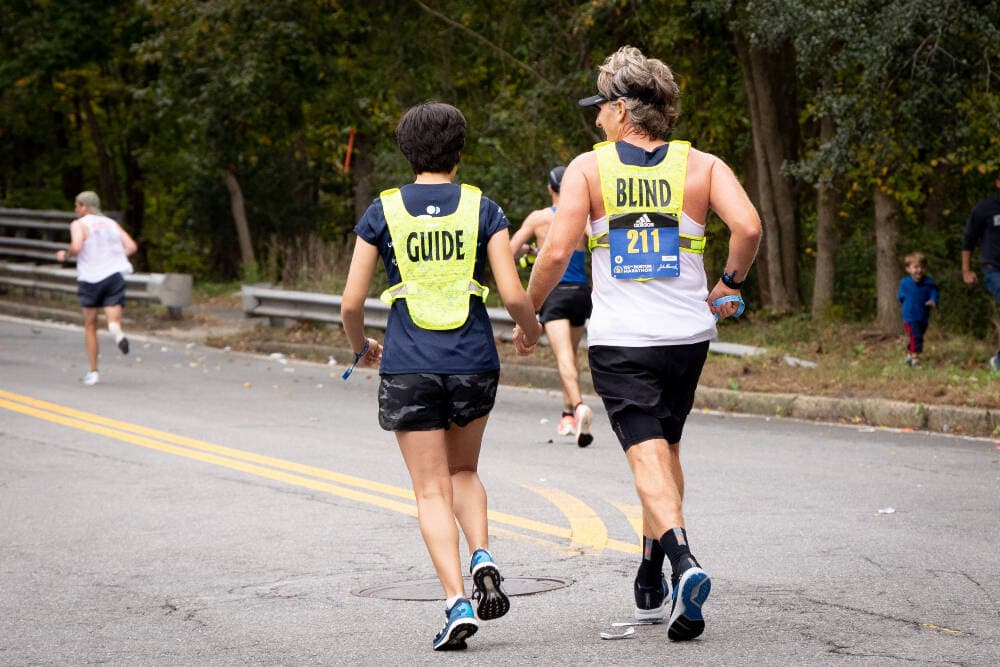
My father, Dan Berlin, is a visually impaired athlete who has run the marathon several times with Team with a Vision, a member of the Boston Athletic Association’s Charity Program. [In 2013,] I had traveled to Boston from Colorado with my dad so he could run his second. I was just 12 years old. I waited by the finish line, chatting with the other families who were there to do the same for their loved ones. Once my dad crossed the finish line, I met him in the family meetup section. This was just moments before the first bomb went off.
At first, there was silence. When the second bomb went off, I knew the most important thing was for me to get my dad to safety. If we got caught in the chaos it would be nearly impossible to guide him out. Luckily, we found a cab and were able to return to our hotel. Later, when we were watching the news from our room, I saw the man I had been talking to about his daughter on TV. He had been injured in the blast.
Except for 2014, I returned to Boston every year as a volunteer, and, after graduating college last year, this Marathon Monday will be my first as MAB Community Services’ Athletic Activities and Communications Coordinator and organizer for Team With A Vision. My father is flying out to cheer me on as the team coordinator, just as I did for him as a runner in years past.
-- Adrien Berlin, Somerville, Mass.
Bill Richard often says Martin will live a full life through each one of us on Team MR8.
Lisa Simmons

I was in the WCVB newsroom working as the 5pm producer when the bombs went off. I will never forget the moment, and the horror that followed on the live feed, and the phone calls that came in from our reporters on the scene. Covering the bombing, the manhunt, the aftermath, the survivor stories and honoring the victims was some of the most important work I have ever done. I felt connected to the family of Martin Richard and wanted to do what I could to honor his memory and continue his legacy. I started to run and joined Team MR8, running the Falmouth Road Race and Boston Marathon '19 and '20 for Martin. My husband and four children have also committed to spreading Martin's message. This year I am honored to be on the MR8 Tribute Team.
The marathon, for me, remains a beautiful community event when we, as a city, welcome people from all across the world and celebrate life. The main thing on my mind is all of the work being done in Martin's memory, and all the people running alongside me who have children's hospital jerseys, or Dana-Farber, or they’re running for diabetes or the Hoyt Foundation. All these people are testing their personal limits to help others.
Bill Richard often says Martin will live a full life through each one of us on Team MR8. The Richard family has taken an unimaginable loss and turned it into a powerful force for good. I cannot wait to cross that finish line and see his family and reclaim our Finish Line once again.
-- Lisa Simmons, Woburn
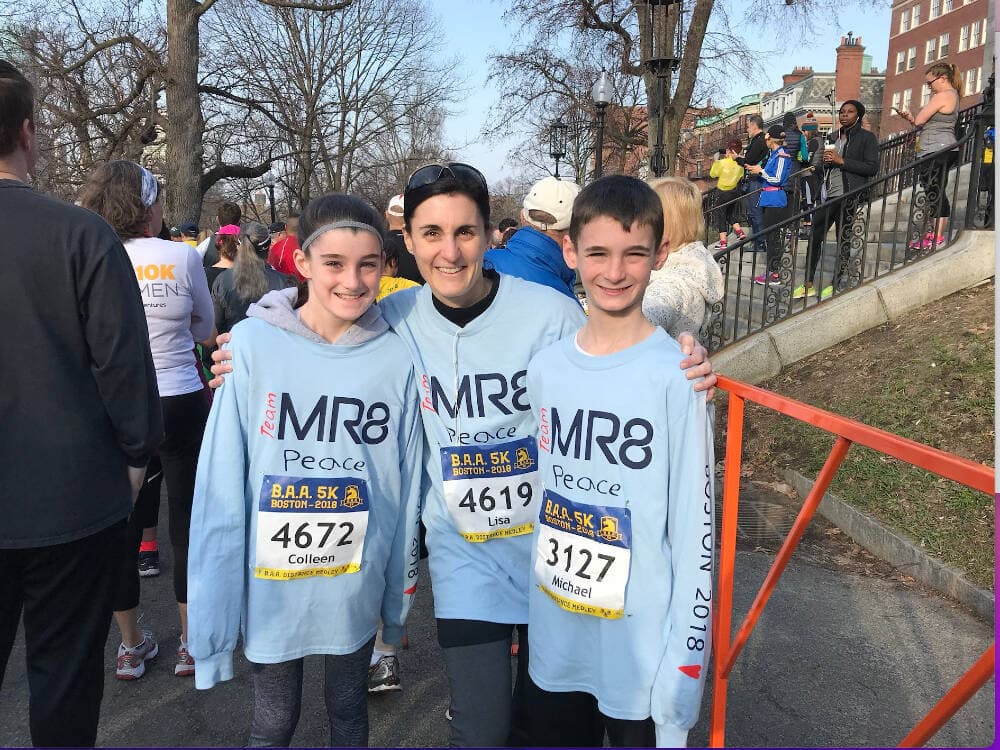
The Boston Marathon is why I majored in English in college. My English teacher the next year, Justin Bourassa, was and still is a marathon runner. When we read “Antigone” that year, he placed the play in the context of the (then very recent) debate over what should be done with Tamerlind Tsarnaiv's body. It really struck me, the idea that this thing which seemed recent and unique was in some ways just a new iteration of an ancient question about how to heal, and what it means to forgive. This is what I think of when I think of the bombing – not an event that brings out the best in us, or the worst in us, but rather something that brings out the oldest questions of society and humanity.
-- Grace Hoglund, Arlington, Mass.
Never having been a runner or a watcher of races, it’s only in retrospect that I understand that beyond the horrifying, irrevocable pain that the bombing caused, its power lies in what it signaled. It was the first real-time event that I learned about on Twitter before the news made its way to conventional outlets. The robo-call that we received from the city of Cambridge early in the morning of April 19th was the first time I heard the phrase “shelter in place,” let alone been instructed to do it.
Now the Marathon means a great deal to me – not as a race, but as an affirmation of community. When people gather along the route, it is a celebration, not just of the athletes, but of the act of gathering.
-- Julie Wittes Schlack, Mass., writer
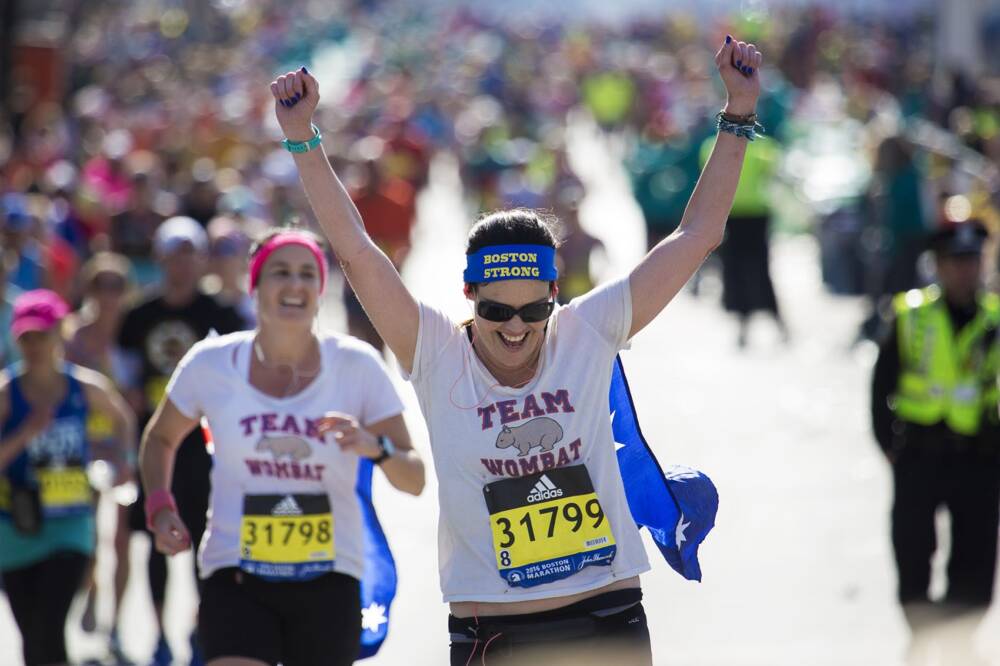
My identical twin had just finished her first Boston Marathon and returned to our hotel room. I told her to stop and let me take a photo of her with her medal. I later found out from the time stamp that I took that photo at the exact moment the first bomb exploded. Over the past 5 years, I've been grateful for the opportunity to support runners who dream of qualifying and running the Boston Marathon by volunteering at the Rivanna Greenbelt Marathon held in Charlottesville, VA. My twin started the marathon so other runners could have the opportunity to qualify.
-- Malinda Ann Hill, Charlottesville, Va.
I have this lovely photo of myself at the finish [in 2005], with my husband and new baby. I found myself at the starting area in Hopkinton, behind the church, sitting on the steps nursing my daughter while all around me, grown men were peeing in the bushes, nervously waiting to enter the starting corrals. The thrill I felt running a marathon after giving birth the previous summer was indescribable. For the only time in my life, I felt invincible.
-- Jennifer, Annapolis, Md.
As Tommy Rivers-Puzey said last year, "we are the lucky ones" who get to experience this.
Anne Normand
I ran the Boston Marathon for the first time last year on my birthday. It’s an incredibly challenging race that forces you to respect the course in a way that a lot of other races don't. There is a joy and sacredness to the event that I don't think I'll find anywhere else.
-- Michael O’Connor, Waltham, Mass.
There is nothing like running the Boston Marathon, the crowds, the awful hills, the scream tunnel, the die hard fans out in Hopkinton early in the morning. I love it all. [This year] I'll be out in the late 20 mile marks screaming for runners and offering them watermelon. Everyone does oranges, but in 2019, someone gave me watermelon around mile 24, and it changed my life. There is a special connection between folks that have run marathons, so I just want to be toward the end to remind them they can do it.
-- Julian, Jamaica Plain, Mass.
The Marathon is a reminder that the struggle can be worthwhile, that hard work counts, that community is real, that we are bound by so many things, that we can succeed both as individuals and as a community.
This will be my 13th Boston, and every experience has taught me more than ever expected. As Tommy Rivers-Puzey said last year, "we are the lucky ones" who get to experience this.
-- Anne Normand, Duluth, Minn.
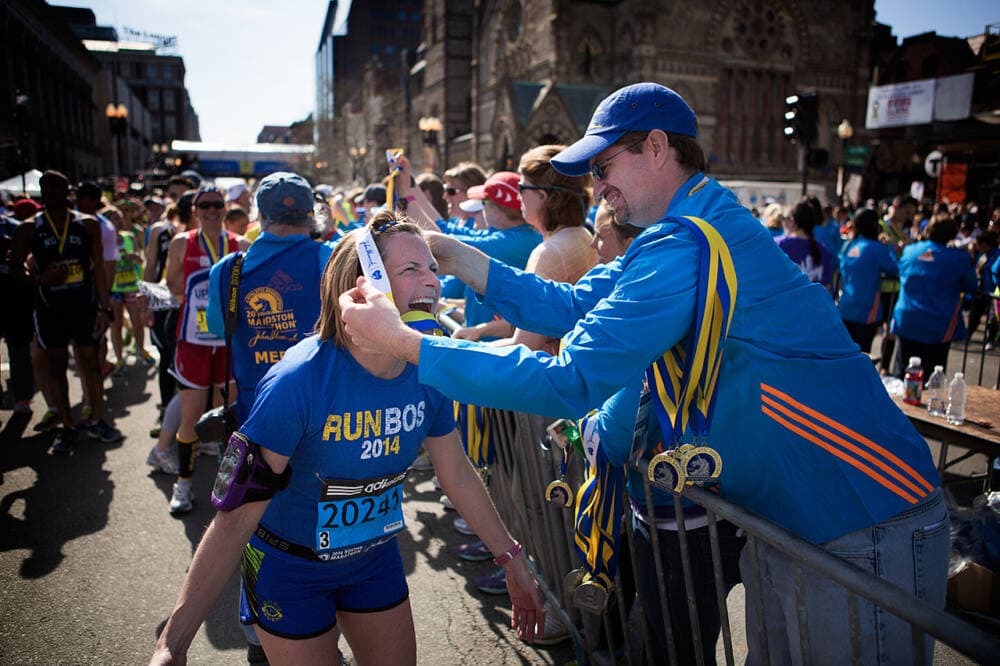
The audio version of this piece was produced by Cloe Axelson with help from Sara Shukla and David Greene. It was engineered by Patrick O'Connor.
This segment aired on April 14, 2023.

